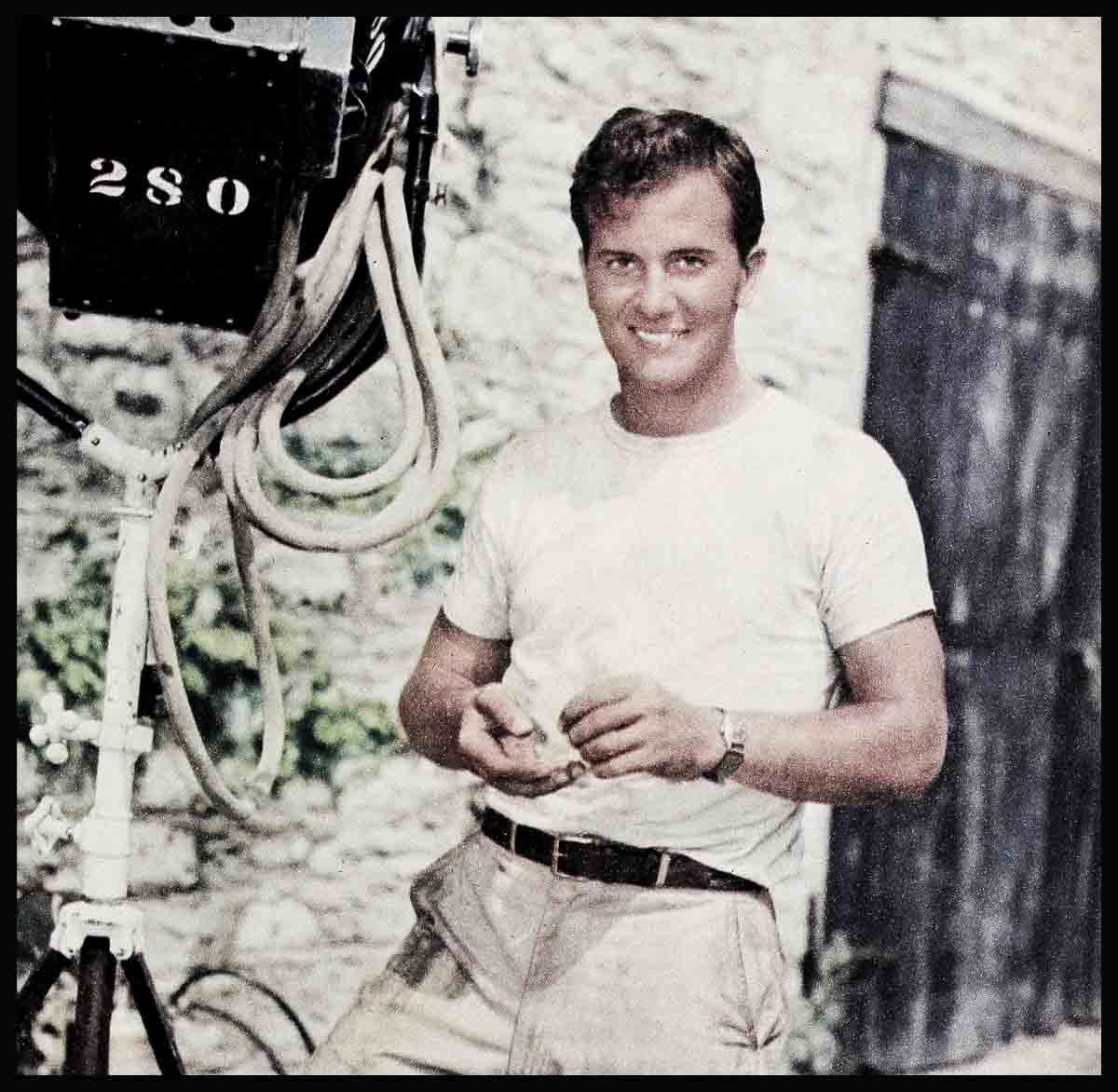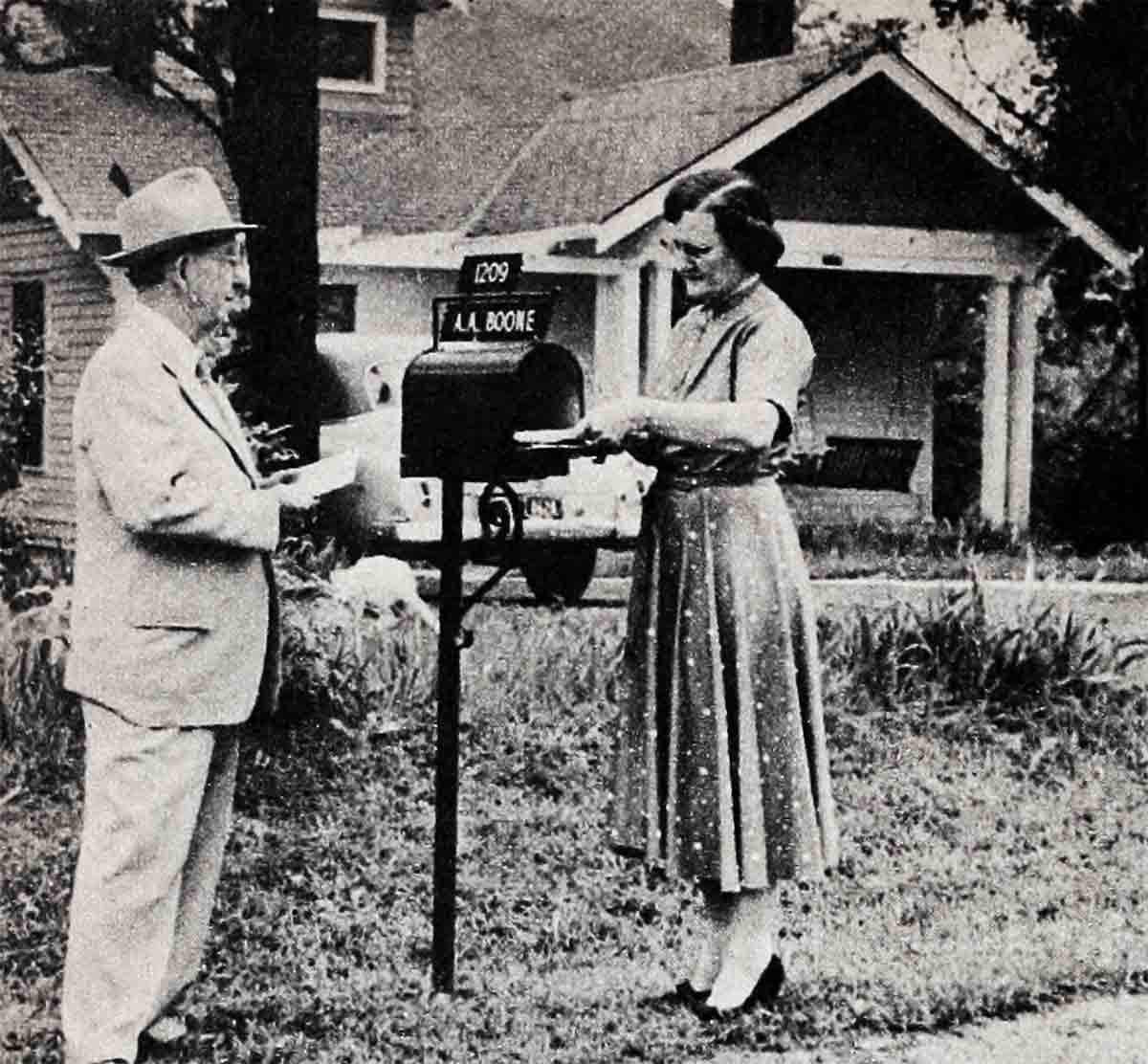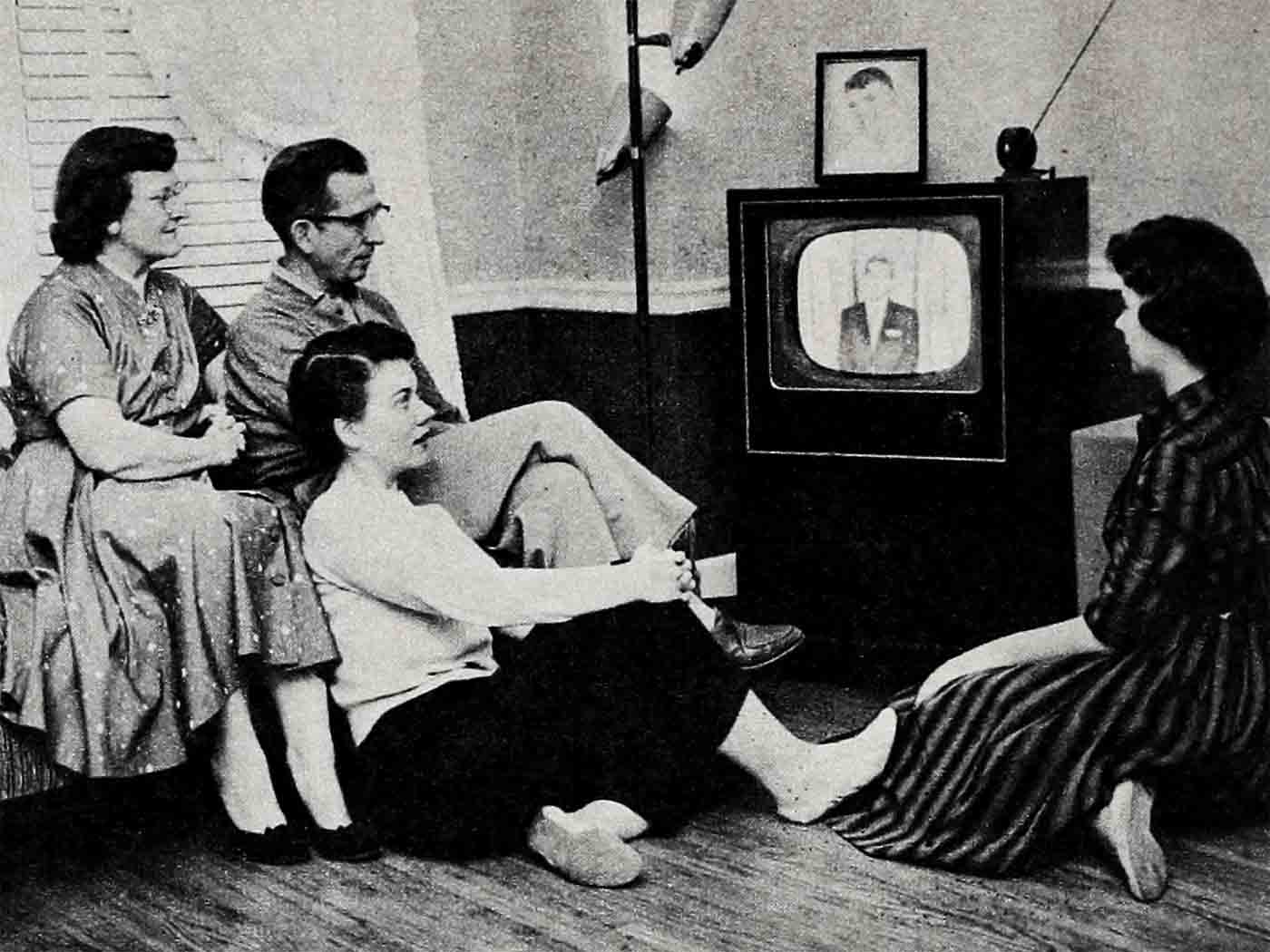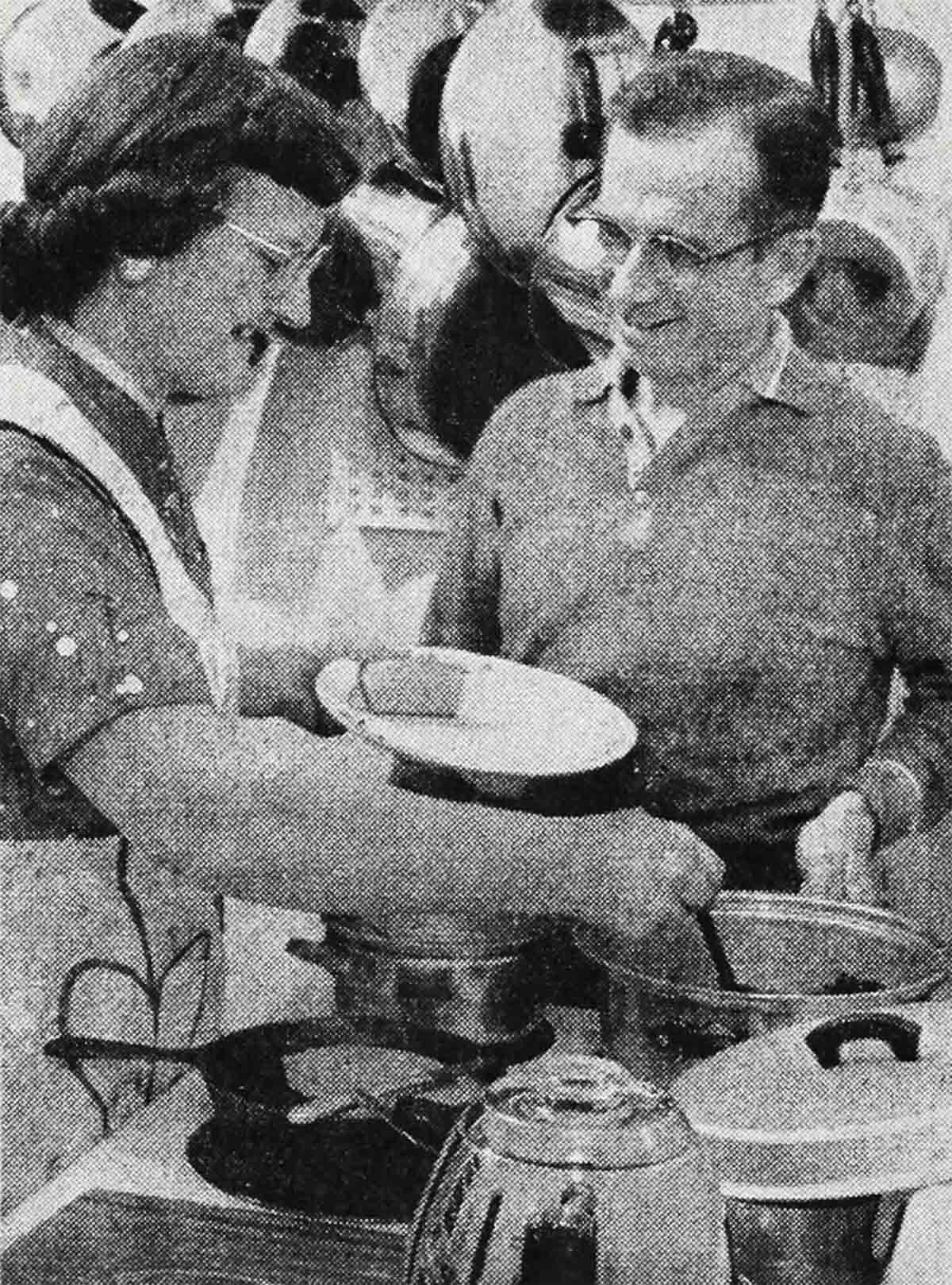
What The Home Folks Think Of Pat Boone?
Pat Boone’s mother looked at Pat Boone’s bride, her eyes troubled, her heart sore. Three years of anxiety and prayer—and now, this final defeat.
“Well,” she said crisply to her son’s new wife, “you won.”
And then, suddenly, Margaret Boone, whose son had just married against her wishes, was swept by a wave of affection for the pretty daughter-in-law whose own mother had so recently died.
“Children,” she cried, “for three years we’ve tried to prove you were wrong. Now we’ll do everything we can to prove you were right.”
And the nineteen-year-old bridegroom, Pat, knew that as usual his mother was ready to forgive, love and help him, despite the fact that he’d courted Shirley Foley secretly and wed her in the face of parental disapproval.
Seated in the living room of the Boone home, a compact white frame dwelling on the outskirts of Nashville, Mrs. Boone smiled as she recalled the day Pat brought his bride home.
“We had nothing at all against Shirley,” she hastens to explain. “There’s never been a sweeter, finer girl anywhere, and never, for a minute, did we object to her personally. We just thought that the children were too young to marry when they did. We’d hoped they’d marry eventually, but after they finished school.
“Actually, we didn’t believe Pat could support a wife and we felt it might be unfair to Shirley for him to marry her so soon.
“But he was sure he could support her, and he was right.”
As a clincher, Mrs. Boone admits with a twinkle, Pat had his parents’ example before him! Twenty years earlier, A. A. Boone and his bride had eloped. He was a draftsman, just graduated from the University of Florida, and she was a student nurse. The trouble was that the nursing school she attended expelled any student who married. But love was stronger than reason, and the couple married secretly. The young Mrs. Boone was graduated and received her nurse’s cap before the news of the wedding leaked out.
Although the Boones are descended from old Tennessee and Kentucky stock, Pat was born in Florida, where his parents began their married life. But the family moved to Nashville when Pat was two, and they have lived in their present home ever since he was six.

When the Boones bought the house, it was in the country, but a fashionable residential section is encroaching. Close by, along the Hillsboro Road, wealthy Nashville citizens have built expensive homes. But the winding, black-topped road on which the Boones live is still bordered by wooded lots and small residences. Patches of corn pepper the landscape.
The Boone yard is heavily shaded. A bicycle is flung carelessly on the ground by the high back steps. There’s an old-fashioned swing on the concrete front porch, and a table with benches in the backyard is a popular place for picnic suppers.
Mrs. Boone’s living room is attractive, but without distinction. Furniture follows no period. Decoration follows no pronounced color scheme. “Nice” and “comfortable” are the adjectives that describe it best.
There’s not much tile in the kitchen or the single bath, and the appliances aren’t new, but neither is anything shabby. Fresh paint sparkles on the house, and good taste abounds within. You know instantly that the Boones feel no need to “keep up with the Joneses.”
Pat Boone’s story is not one of rags to riches. His father is quite successful. A. A. Boone, described by his wife as “the best natured man in the world,” is a busy contractor, and his name appears on some of the big construction jobs in downtown Nashville.
Pat inherited his appearance from his mother. Everybody comments on the marked resemblance. But he inherited his disposition from his father, Mrs. Boone thinks.
“Mr. Boone never loses his temper,” she says. “I used to have a violent temper, but he laughed at me until I got over my tantrums.”

The Boone children are Pat, twenty-three years old; Nick, twenty-two; Margie, nineteen; and Judy, fifteen.
Friends consider Pat and Nick very much alike, both interested in drawing and music, both excellent students. Paintings by Nick adorn the living room walls.
The girls, their parents have noted, aren’t such keen students as the boys. Possibly their fresh prettiness and popularity have interfered with studies.
“Judy just isn’t interested in studying this year,” Mrs. Boone laments.
But Judy, a high school sophomore, is adequately passing .a thorough college preparatory course.
Margie, a new bride, embarked on nurse’s training after high school. Whether she’ll finish her course depends upon her husband’s plans.
The Boone family, incidentally, saw “Bernardine” for the first time as guest of their future son-in-law, Airman Kenyon Jenckes. The airbase theater got the picture several weeks ahead of Nashville houses, and Kenyon furthered his courtship of Margie by inviting the family to see it with him.
Pat’s parents were thrilled by his performance but felt that the whole evening had a dream-like quality.
“It’s just hard to believe that all this has really happened to Pat,” they say.
Nick was graduated last June from David Lipscomb College, and is following in his brother’s footsteps, taking a graduate course in dramatics at Columbia University, where Pat will receive his B.S. degree in February. Nick is also being launched on a promising singing career by Dot Records, under the name of Nick Todd—to avoid confusion. His first record, “Plaything,” was recently released.
Mrs. Boone is proud of all her children, as well she can be. But she modestly belittles her own part in their development.
“Of course,” she admits, “we’ve tried to give all the children moral and religious training—supplemented sometimes with a paddle! Yes, we’ve spanked them, and we’ve prayed with them.”
She laughs when she recalls the last time the paddle was applied to Pat. “He was seventeen,” she says, “and Nick was sixteen. The boys were having some kind of scrap about their clothes. They were fighting and fussing, and first thing I knew, I was in the middle of it.
“Big as they were, I decided the thing to do was whip them both. Pat was taller than I was, but I told him to get over my knee, and he did. His elbows, bless his heart, were on the floor and his feet were in the hall, but I paddled him. Then it emcee turn. They never fought after that!
“We believe, too,” Mrs. Boone adds, “that children should have regular chores. Pat and Nick washed dishes until the girls were big enough to take that over. Then the boys milked and kept up the yard.”
Keeping up the Boone yard is no mean feat. The property originally embraced ten acres, and although some of it has been sold, the lawn is still sizable enough to give two boys quite a workout.
Another thing we feel is important,” Mrs. Boone says, “is that children should never hear their parents argue. Mr. Boone and I have never disagreed about the children in their presence.”
But Margaret Boone, in the final analysis, gives David Lipscomb, where Pat attended high school and one year of college, and the Bible greatest credit for Pat’s character.
“Religion was taught him every single day at school,” she says, “through Bible study and through the wonderful example of his teachers.”
Lipscomb is described by its dean as “church related.” That means the school is related to, but not owned by the Church of Christ, of which the Boones are staunch members. In Nashville, known as “the Athens of the South” because of its many fine private schools, David Lipscomb is not so fashionable as Vanderbilt, neither is it so large. But its adherents consider its scholastic standing second to none.
On the campus, new, pink brick buildings are crowding the weathered, red brick of older structures. Winding walks, sheltered by beautiful trees, welcome strolling couples. And it was here that, for Pat Boone and pretty, dark-haired Shirley, love bloomed.
Mack Craig, Pat’s high school adviser, Latin teacher, and witness at his marriage, recalls, “Shirley was crazy about Pat during his junior year, but he was too busy to get involved. It was the next year that he really got serious about his romance.”
And what kept Pat so busy?
In the first place, he was taking a stiff high school course including four years of math and four of science. He was cartoonist for the school paper and a five-letter athlete. He was master of ceremonies for a high school talent show broadcast each Saturday by a Nashville radio station, and, finally, he was deeply engrossed in church activities.
“I was preaching at that time,” Mr. Craig recalls, “and Pat led the singing at my services. He was always in such a hurry that when I’d stop by to pick him up, he’d run out with his dinner on a plate and eat it in the car. His toothbrush was usually in his pocket.
“It got to be a joke with us. Wherever Pat went, he was carrying a plate full of food and a toothbrush!”
Pat was carrying an almost impossible load of work, but was handling it successfully, Mr. Craig explains, because he has an I.Q. Of 160.
“That,” his former teacher and good friend says, “is much higher than very superior, and a person with that much intelligence is usually versatile.”
“Right here,” Craig adds, “I’ve got to say a word about Rosemary. Rosemary was Pat’s cow, and I think she had a high I.Q., too. Certainly she was adaptable.
“While Pat was engaged in all these activities, he was also milking and taking care of Rosemary. And he milked her at the strangest hours. Sometimes he wouldn’t have time to milk until after midnight. But poor Rosemary didn’t seem to mind. She was the most cooperative cow I’ve ever known.”
Craig, who rose from classroom teacher to principal of David Lipscomb High School and who is now dean of David Lipscomb College, joined Mr. and Mrs. Boone in their concern for Pat and Shirley when the young people’s romance became serious.
“I talked with them time after time about it,” Craig says. “I knew Pat so well and realized that he was a most level-headed youngster, but I was afraid that he wasn’t ready for the responsibility of marriage.”
Shirley Foley Boone is the daughter of country western singer “Red” Foley, who was connected with the Grand Ol’ Opry in Nashville. She entered David Lipscomb High School as a boarding student when her mother became seriously ill, and caught Pat’s eye when she sang with a school quintette.
“Some stories say,” Pat’s mother observes, “that he never dated anyone but Shirley, but that’s not true. Pat dated several girls. But he never went steady with the others.
“The first time I met Shirley, Pat brought her in with a crowd of boys and girls who were going sledding.”
Mrs. Boone looks contentedly around her small but attractive home.
“We never lock the door. We always want the children’s friends to feel welcome here, and they come and go constantly. So I didn’t pay any particular attention to Shirley when she came in with Pat and a crowd.”
Later it dawned on the Boone family that Shirley Foley was not just another girl to Pat. She was very special.
“And she is special,” her mother-in-law boasts. “She has what you might call a bubbling personality.”
When the teenagers began to talk about getting married, the Boones became alarmed and enlisted the aid of Principal Craig.
“Actually,” Margaret Boone recounts, “we thought we’d broken up the romance. We understood that Pat and Shirley had quit seeing each other. Of course you can’t keep children in love from seeing each other unless you tie them to the bedposts or lock them in their rooms. Both Pat and Shirley gave the impression that their romance was finished.”
A good friend of Shirley’s recalls the two-month interval of clandestine meetings.
“Shirley told us,” she says, “that she and Pat had broken up, so we were dumfounded when they married. During the time they were supposed to be through, Shirley had occasional dates with other boys, but I don’t think Pat dated anybody.”
Where did they meet so secretly for their Romeo and Juliet style courtship?
“I can’t imagine,” the friend says. “Neither of them has ever said.”
But while most of the world concluded that Pat Boone and Shirley Foley had said “goodbye,” a handful shared their exciting secret, the knowledge that they were planning to marry.
One was “Red” Foley, the bride-to-be’s father. Shirley’s mother had died, and her father had remarried. Mr. Foley felt that Shirley’s greatest chance for happiness lay with Pat, and he agreed to their wedding plans. In fact, since Shirley was under age, he signed legal consent to the match.
Another who knew about the impending ceremony, although at the last minute, was Nick, Pat’s younger brother. What he thought about it is not on record, but he kept the secret.
Finally, wise, deeply interested Mack Craig knew the truth. He even bought a suitcase for Pat’s outfit and flowers—orchids—for the bride. Then, as the most gallant gesture of all, he broke the news to Pat’s parents.
“When it was certain that Pat and Shirley were going to marry in spite of everything,” Craig says, “I decided to help them. I wanted them to have a ceremony they could remember as beautiful and dignified, no hole-in-the-wall affair.”
The wedding day was Saturday, and Pat left home that morning to go to the radio station where he worked part-time. He didn’t take so much as a change of clothes with him.
Then Mr. and Mrs. Craig, Pat and Shirley went to Springfield, Tenn., an hour’s drive from Nashville, for the exchange of vows.
That evening, Pat’s parents, brother, and sisters were getting ready to go to a church service when Craig called and said he was coming, over to discuss a serious matter.
“Right away,” Margaret Boone remembers, “I felt sure what it would be. I told Nick to take the girls and go on to church ahead of us.”
And Nick, who also felt pretty sure what it would be, left with considerable haste.
Mr. and Mrs. Craig crossed the front porch with misgivings, fearful of how they and their news would be received.
Did the Boones resent what the Craigs had done in helping Pat to elope? Not for an instant, they say.
“We know that Mack and Dottie love our children as much as we do,” Margaret Boone explains, “so we knew they had done what they felt best for Pat.”
When the bride and bridegroom came home next day, they moved in with the Boones temporarily. Later, they settled in a housing project back of the David Lipscomb gymnasium, and their subsequent moves to Texas, New York, and Hollywood are show business history.
During the few weeks that the newlyweds lived with Pat’s family, Margaret Boone and her daughter-in-law developed a strong bond of understanding and mutual admiration. Margaret was even brave enough to give Shirley some cooking tips.
“I tried,” she says, “to teach her to prepare some of Pat’s favorite dishes. He loves chess pie, he’s crazy about squash cooked with onions and seasoned with bacon drippings, and he can’t get enough fried corn. Shirley can cook squash the way he likes it, and she makes a nice chess pie, but she can’t get the knack of frying corn.
“I believe,” Mrs. Boone confides with a burst of sectional pride, “that you have to be born in the South to master that, and Shirley wasn’t.”
But fried corn or no, Pat Boone’s mother likes his wife better every day.
“Shirley has so much talent of her own,” her mother-in-law declares. “Pat loves to hear her sing, and they sing beautifully together. Still, she’s completely satisfied to give up any thought of a career and devote herself entirely to his welfare and to the children. They hope they’ll have several more children, and they say they’re going to send them to David Lipscomb to school.”
Should Pat’s children come to David Lipscomb, Dean Craig will feel almost like a grandfather, because he not only supervised Pat’s marriage but launched his professional singing career.
“I don’t think this story’s been told,” he says. “The Nashville Civitan Club had an amateur contest and invited each high school to be represented. We entered Pat and felt sure he’d win, but he didn’t even place. However, Jim McKinney from a local radio station heard Pat compete and, after the contest, gave him a lot of encouragement.
“Pat told me about it, and I got an idea. I thought it would be feasible to broadcast a weekly radio program featuring high school talent, and I thought, too, that Pat would be an ideal singing master of ceremonies.
“I talked with Mr. McKinney about it. He said he’d had the same idea, and pretty soon the show was on the air. Understand, I don’t take credit for the show. It was Pat’s talent that sold the station on the program.”
Pat, nevertheless, must think his old friend and teacher deserves a lot of credit. He recently presented him with a brand new station wagon—fire-engine red!
In a country where movie stardom is the ambition of millions, it’s ironic to realize that Pat Boone’s family and friends have reservations about his career. His parents and the Craigs, alike, sometimes ask themselves whether or not Pat’s plunge into the entertainment world was wise.
“Oh,” his mother says, “we’re very proud of him, and we’re grateful that the Lord blessed us not only with one fine son but with four fine children.
“We’re humble, too, before the wonderful way in which the public has received Pat. But we worry. We realize that he’ll be under pressures, and we pray that he won’t lose sight of spiritual values. We don’t think he will, but sometimes we’re frightened.”
Craig says, “I talked with Pat about his plans for a career when he was in the ninth grade. I talked with him often and tried to advise him. Then he had no idea that his future would be so surprising. He hadn’t thought of theatrical work at all but was strongly attracted by religion.”
“He taught Sunday School and worked at a day camp,” Mrs. Boone interjects, “and he found teaching appealing because of his fondness for children.”
“You know,” Craig continues, “he’s still going to get his teacher’s certificate from Columbia.
“And,” the dean beams proudly, “if his grades don’t drop, he’ll be a Phi Beta Kappa.” With a grin, he added, “David Lipscomb specializes in college preparatory work.”
A person with Pat’s intelligence and versatility, Craig points out, could be a tremendous success in many fields.
“But Pat feels,” his mother says, “that the Lord has been responsible for his success as a popular singer and, therefore, the entertainment world must be the right place for him . . . for the present, at least.”
And wherever Pat goes in the future, Margaret Boone knows that he will have a Divine Guide at his side.
“None of my children has ever questioned the divine inspiration of the Bible,” Mrs. Boone says. “Pat accepted it completely when he was a child. And when Pat, or any other person, has really accepted the Bible’s teachings, he won’t go too far wrong.”

MRS. BOONE’S FRIED CORN
There’s only one secret to preparing fried corn—choose corn that’s young, milky and tender. That’s of prime importance. Melt butter, or better yet, bacon grease, in a heavy skillet. Add the corn, scraped from the cob, and cook very, very slowly, stirring often. If the corn is nice and milky, it will cook in its own juice. If not, add a little water—just a little. Taste dictates seasoning,—salt, pepper, and maybe sugar. When it’s cooked down low, it’s simply delicious!
MRS. BOONE’S CHESS PIE
This is one of Pat’s favorite desserts, called “chess cake” in some circles.
2 cups sugar
3 eggs
2 tbs. Milk
2 tbs. corn meal
¼ Ib. butter
2 tbs. vinegar
1 tbs. vanilla
Cream butter and sugar. Add eggs, meal, milk and vinegar and mix well. Add a tablespoon of vanilla. Pour into uncooked pie crust. Start in hot oven. Reduce heat and finish baking.
THE END
—BY NANCY ANDERSON
It is a quote. PHOTOPLAY MAGAZINE JANUARY 1958





No Comments